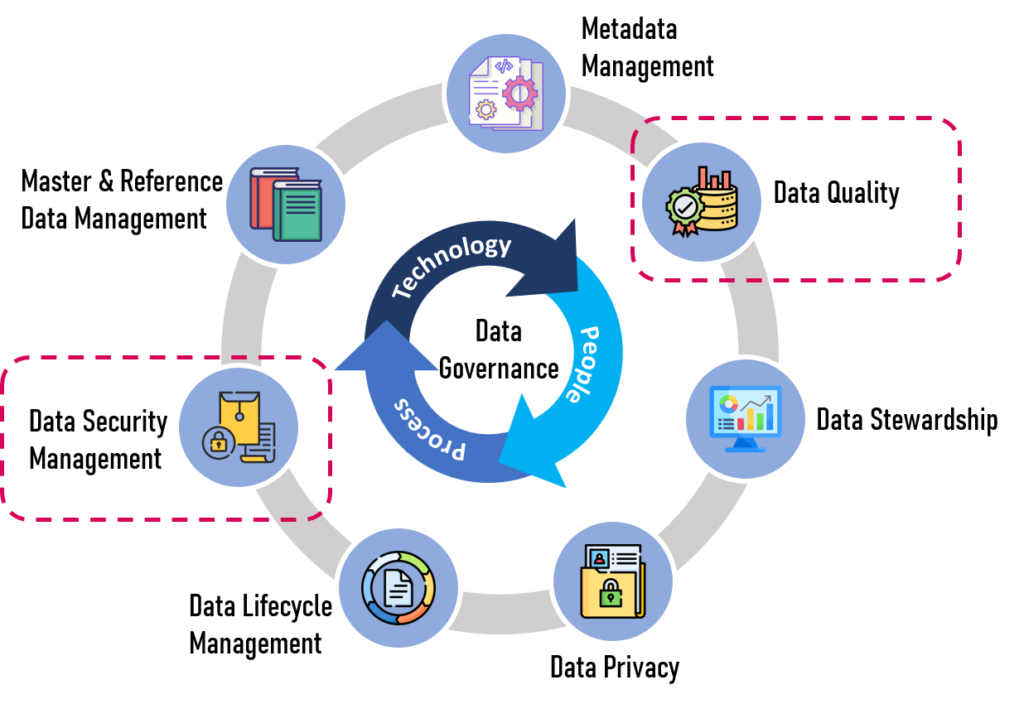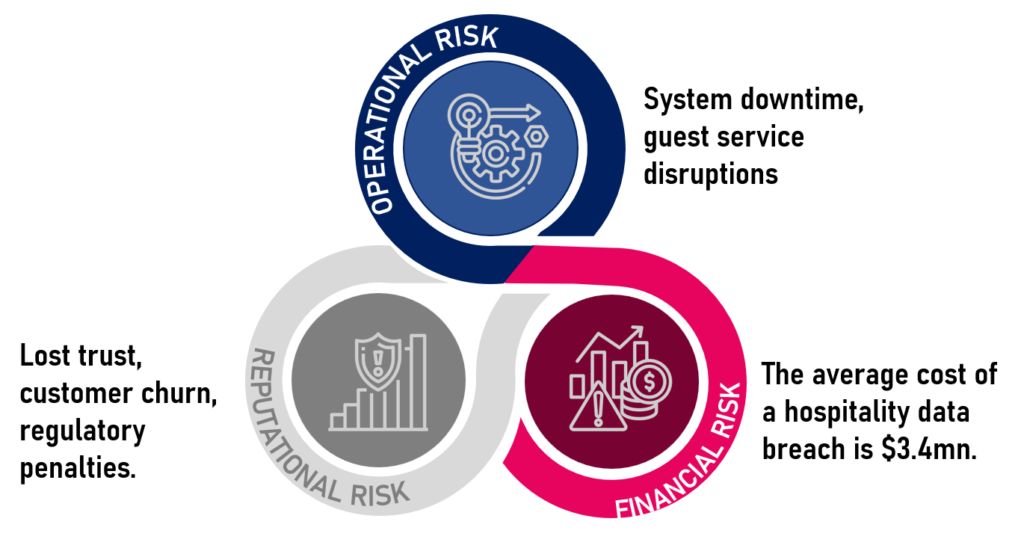Data Security – A Strategic Approach to Future-Proof Hospitality
The Transformation Imperative: Hospitality in the Digital Age
The hospitality industry is undergoing an overall industry-wide shift and transformation. AI, automation, and data-driven decision-making are revolutionizing guest experiences, streamlining operations, and redefining revenue models. However, transformation is not just about deploying technology—it requires a fundamental rethinking of business models. Hotels must embrace data-driven transformation, where strategic data security and management underpins every aspect of hospitality operations.
For transformation to be successful, data must be at the core of decision-making. A fragmented, siloed approach to data will create inefficiencies and vulnerabilities, preventing hospitality businesses from unlocking the full potential of AI-driven innovation. Tech cannot compromise for broken fundamentals—without a robust data foundation, even the most advanced AI solutions will fall short.
This challenge is best explained through the Semi-Dirac Paradox, which illustrates the delicate balance between agility and constraint. AI-driven personalization requires massive amounts of guest data, but an overreliance on AI without strong data security creates significant risks. On the other hand, excessive restrictions can stifle innovation. The key lies in securing data while maintaining the agility to innovate—a challenge hospitality leaders must navigate.
The Strategic Role of Data in Hospitality
Data is the backbone of modern hospitality. From AI-powered personalized guest experiences to predictive analytics for revenue management, the ability to harness and secure data defines business success. However, many hospitality businesses appear to lack a coherent data strategy, leading to missed opportunities and increased risk exposure.
A well-structured data strategy should focus on:
- Data collection and governance: Ensuring data accuracy, completeness, and compliance with regulations.
- Data integration: Breaking down silos to create a unified guest profile across touchpoints.
- Data analytics and insights: Leveraging AI for personalized experiences, demand forecasting, and operational efficiency.
- Data security and privacy: Protecting guest trust and ensuring regulatory compliance.

Data Security as a Pillar of Data Management
Data security is not a standalone function—it is an essential part of the data management lifecycle. As hospitality businesses enhance their data capabilities, data security must be embedded at every stage.
The Cost of Poor Data Security in Hospitality

A single breach can cost a hospitality business millions—not just in financial penalties but also in lost trust. Consider the infamous Marriott data breach, which exposed 500 million guest records and led to over $100 million in fines and lawsuits. The average cost of a hospitality data breach stands at $3.4 million, with additional consequences including:
- System downtime that disrupts guest services
- Regulatory fines under GDPR, PCI-DSS, and CCPA
- Lost customer trust and increased churn
For an industry built on guest experience, a data breach is not just an IT problem—it is a business resilience issue.
Learned Helplessness in Hospitality Data Security
Many hotel brands operate under the assumption that breaches are inevitable, leading to weak security investments. This phenomenon—learned helplessness—prevents hospitality leaders from taking decisive action. The reasons include:
- Complex regulations that seem impossible to navigate
- Legacy systems that appear too costly to replace
- A fatalistic mindset: “Breaches will happen anyway”
However, passive security is no security. Hospitality leaders must break this cycle and adopt a business-centric, proactive data security strategy.
Rethinking Data Security: A Strategic Imperative
Data security must shift from being a compliance requirement to a competitive advantage. Key strategic moves include:
1. Building a Data-Conscious Culture
AI thrives on secure, well-governed data. Without it, automation becomes compromised. Hotels must train staff, from front desk employees to senior executives, on data-conscious decision-making.
2. Mastering the Semi-Dirac Balance: Security & Personalization
The Semi-Dirac Paradox plays out in hospitality as a tug-of-war between personalization and security. Hotels must find equilibrium through:
- Secure AI-powered guest personalization
- Privacy-first architectures: Tokenization, edge computing, AI-driven access control
- Centralized data governance to ensure compliance and data security across properties
3. Integrating Data Security into Business Strategy
Hotels with proactive security measures see 30% fewer breaches and retain 60% more customer trust. Hospitality executives must align data security with:
- Guest experience: Secure check-in, digital keys, and loyalty programs
- Revenue operations: AI-driven pricing and demand forecasting
- Technology & compliance: Strategic partnerships with vendors for secure data handling
4. Property-Level Data Security: The General Manager’s Role
While data security policies and technology decisions are centralized, many breaches originate at the property level. General Managers must take ownership by:
- Training staff on secure data handling practices, to be able to change behavior
- Monitoring daily risks in hotel entry, check-in, F&B, and concierge and check-out interactions
- Implementing fraud prevention measures for phishing and social engineering threats
Future-Proofing Data Security in the AI Era
The next wave of hospitality innovation relies on AI-powered personalization, predictive analytics, and automation. However, AI, or for that matter, Technology cannot compensate for broken security fundamentals. Future-proofing data security requires an approach that ties security to the broader transformation strategy.
To achieve sustainable AI-driven transformation, hospitality businesses must:
- Align AI innovation with strong security foundations: Without proper data security, AI will amplify vulnerabilities rather than mitigate them.
- Establish a continuous learning culture: Security threats evolve rapidly, requiring ongoing training and adaptive security strategies.
- Invest in AI-driven security measures: Leveraging AI for real-time threat detection, anomaly detection, and automated risk mitigation ensures proactive security.
- Bridge operational and strategic divides: The disconnect between central IT policies and on-property operations must be resolved through clear security protocols, property-level accountability, and executive buy-in.
True transformation in hospitality requires an unwavering commitment to data integrity, security, and business resilience. Data security is no longer a mere compliance necessity—it is a core pillar of sustainable business success.
Data Security as a Business Resilience Strategy
In hospitality, data security is not just about compliance—it is about maintaining guest trust, driving operational efficiency, and safeguarding the future of the business. Hotels that embed security of data into their strategic DNA will not only minimize risks but also enhance their brand reputation and guest loyalty.
The path forward is clear: break free from learned helplessness, balance the Semi-Dirac paradox, and adopt a security-first mindset. Tech cannot compromise for broken fundamentals—hospitality leaders must act now.
This article is built (with AI help) from a presentation made by 3nayan at a gathering hosted by ETCIO.